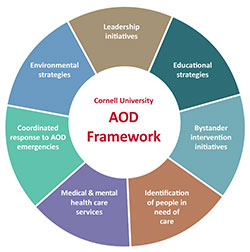Our campus approach
For more than a decade, Cornell has cultivated a culture of collective responsibility for the prevention of alcohol and other drug (AOD) misuse.
Our campus leaders recognize that every member of our community has an important role to play in AOD prevention, including students, staff, parents, alumni, and members of the Ithaca community.
Cornell uses an "AOD Framework" to support our comprehensive public health approach to preventing harm and reducing AOD misuse among Cornell students. View our AOD Framework fact sheet.
Cornell regularly conducts survey research and evaluation, and staff members monitor trends in substance use which results in data-driven strategies for prevention. Campus efforts include services, programs, policies, and other initiatives designed to reduce the harmful consequences associated with AOD use.
The Skorton Center for Health Initiatives provides strategic leadership for this important public health issue.
AOD Biennial Review:
View Cornell University's 2022-2024 AOD Biennial Review.
AOD priorities and initiatives:
The following components make up our AOD Framework.
Leadership Initiatives
Campus Health Executive Committee: Senior administration provides oversight of health policy and strategies, including AOD-related initiatives.
Coalition on Mental Health: Staff, faculty, graduate and undergraduate student leaders inform the development of prevention and intervention strategies related to AOD misuse, associated violence, and hazing.
Strategic Plan: The Cornell Strategic Plan includes the following goal in service of educational excellence: “Promote the health and well-being of students (undergraduate, graduate, and professional) as a foundation for academic and life success.”
Support for sobriety: The Sober@Cornell student club and sober housing initiative provide support for students who wish to remain sober throughout their time on campus.
Late night programs: Appealing, student-led, alcohol-free programming available at night.
Research: The Skorton Center for Health Initiatives at Cornell Health conducts AOD-related student surveys to inform educational strategies, policies and services.
Educational Strategies
Skorton Center for Health Initiatives: Provides leadership related to harm reduction, bystander intervention, data collection, and social norms outreach strategies.
Alcohol education: All incoming first-year students are expected to complete an online educational program before arriving on campus.
Online resources: Self-assessments and web information about AOD is available at health.cornell.edu.
Media communication: Advertisements, posters, resource cards, and web pages promote positive social norms and educate the community about alcohol emergencies, along with availability of campus resources and attentiveness to AOD concerns.
Bystander Intervention Initiatives
Intervene: A 20-minute video and corresponding interactive workshop teach students how to apply a key set of bystander intervention skills to real-life situations. A series of brief scenarios show college student bystanders actively intervening to reduce the risk of problems, including sexual assault, harassment, intimate partner violence, hazing, bias, emotional distress, and alcohol emergencies. An alcohol emergency scene shows a group of students recognizing signs of an alcohol emergency and calling 911 for medical help.
Cornell’s Good Samaritan Protocol: Encourages students to call for help in alcohol or other drug emergencies. When students call for help on campus, neither they nor the person in need of medical attention will get in trouble for underage drinking, drug possession, or disorderly conduct. See more: GoodSam.cornell.edu.
Cayuga’s Watchers: Students attend parties as designated non-drinkers who keep an eye on attendees and intervene in situations to reduce risk.
Identification of People in Need of Care
Although some students are proactive about seeking therapeutic support for their drinking or drug use, many others are not aware of the harms caused by their substance misuse. Stigma and misunderstanding often prevent people from asking for help, so compassionate conversations are important. Routine screenings at medical and mental health appointments, as well as encouragement from concerned family members, friends or faculty can help people identify the issue and accept the appropriate care.
Screening by Cornell Health:
- Health history form: First-year and transfer students who identify (on pre-matriculation health form) a history of AOD concerns/treatment receive information about services and support before arriving on campus.
- Primary care alcohol screening: Medical patients are assessed at the time of their visit. Those indicating concerns related to alcohol are given referrals to resources or self-care.
- BASICS (Brief Alcohol and Other Drug Screening and Intervention for College Students): This psycho-educational intervention allows students to explore their AOD use in a non-judgmental environment. Students are referred to BASICS by health care providers and by the Office of Student Conduct and Community Standards, as well as by self-referral.
AOD Incident Review Meetings & Alert Team: Staff members from key departments meet weekly to discuss AOD incidents and situations involving students whose behavior or well-being is of concern to others.
EARS (Empathy, Assistance, & Referral Services): Student volunteers (trained by Dean of Students staff) provide anonymous telephone or walk-in peer counseling for undergraduate and graduate students.
Victim Advocacy Program: Designated staff members support victims of crimes, violence or other traumatic experiences in which alcohol may have played a role.
Medical & Mental Health Care Services
Cornell Health: Staff members provide a collaborative approach to health care. Medical and mental health professionals work together to provide care for students with complex health issues, including substance misuse.
Care Managers & Behavioral Health Consultants: Care managers facilitate the coordination of services to meet the needs of individual students and Behavioral Health Consultants within primary care provide support for a range of psychological and behavioral issues, including AOD use.
Counseling & psychiatry staff: Staff members provide on-campus services for students who want to learn more about their own use of AOD, reduce or eliminate their use, or are worried about a friend or family member’s use of AOD. Services include individual and group counseling, same day triage and emergency care, and referral to community providers for off-campus and specialty care. Free, walk-in “Let’s Talk” consultations with counselors are also available at multiple campus locations.
Coordinated Response to AOD Emergencies
On-Campus:
- 24/7 Phone Consultation: Health care providers are available to answer questions and make referrals as needed (607-255-5155). On-call service is outsourced.
- Cornell Police: Community members can call 911 for AOD emergencies on or off-campus.
- Crisis Managers: Staff members are on-call at all times to coordinate the university’s response to crisis situations.
- Community Support Team: Staff members from across the university provide support for individuals and groups in the aftermath of tragedies or other crises.
- CUEMS: A New York State-certified, student-run, emergency medical service. Student EMTs respond to medical emergencies on campus and surrounding university-owned properties.
Off-Campus:
- Bangs Ambulance: This local company provides emergency evaluation and transportation to the local hospital.
- Cayuga Medical Center (CMC) Emergency Department: The local hospital receives and treats individuals for AOD emergencies and refers students to Cornell Health for follow-up care.
Environmental Strategies
Consistent enforcement of laws & policies:
The Office of Student Conduct and Community Standards, the Cornell Police, and local (Ithaca) police strive for clear and consistent enforcement of policies* and laws. Clear campus policy information is designed to support state and federal law and restrict access to alcohol and other drugs.
- Residential environment: House Rules prohibit students under the age of 21 from being “in the presence of” alcohol. Campus and state policy/law prohibit all residents from using illicit drugs.
- Fraternity and sorority environment: Recruitment and new member orientation period for fraternities and sororities are required to be alcohol-free. Hard alcohol (more than 30% alcohol by volume) is not permitted in a residential chapter house at any time. Event Management Guidelines include prohibition of kegs and hard liquor at all events, unless provided by a licensed caterer.
Regulation of campus events:
Special campus events such as Homecoming, Slope Day, and Senior Days involve coordinated planning across campus. Strategies include management of the physical environment, regulation of access to alcohol, and collaboration between campus and community law enforcement agencies.
National collaboration
Between 2011 and 2014, Cornell joined with colleagues and universities from around the country to address the problem of high-risk drinking by participating in the National College Health Improve Project (NCHIP). The NCHIP Learning Collaborative on High-Risk Drinking used evaluation and measurement techniques—including the Plan, Do Study Act (PDSA) Model—to identify and implement strategies to tackle high-risk drinking and the associated harm.
Data collection
Cornell regularly collects data related to AOD use through campus surveys. Examples of the survey instruments include Cornell’s Alcohol and Social Life Survey, New Student Survey, Cornell Undergraduate Experience Survey, and annual Slope Day Survey.
Data-driven interventions
View our "Slope of Change" poster for a snapshot of our environmental approach to reducing high-risk drinking on Slope Day. You may download the PDF here (CU NetID required), or email us for a copy.



